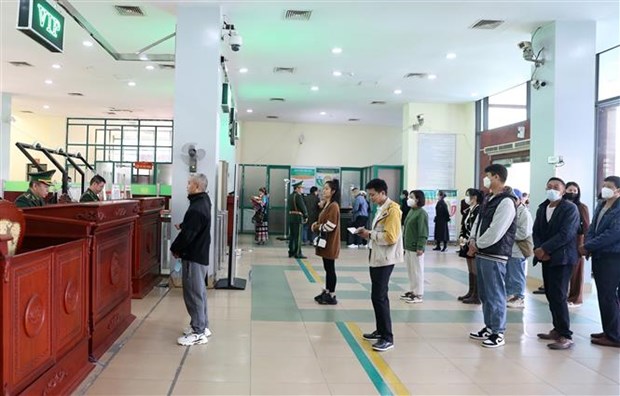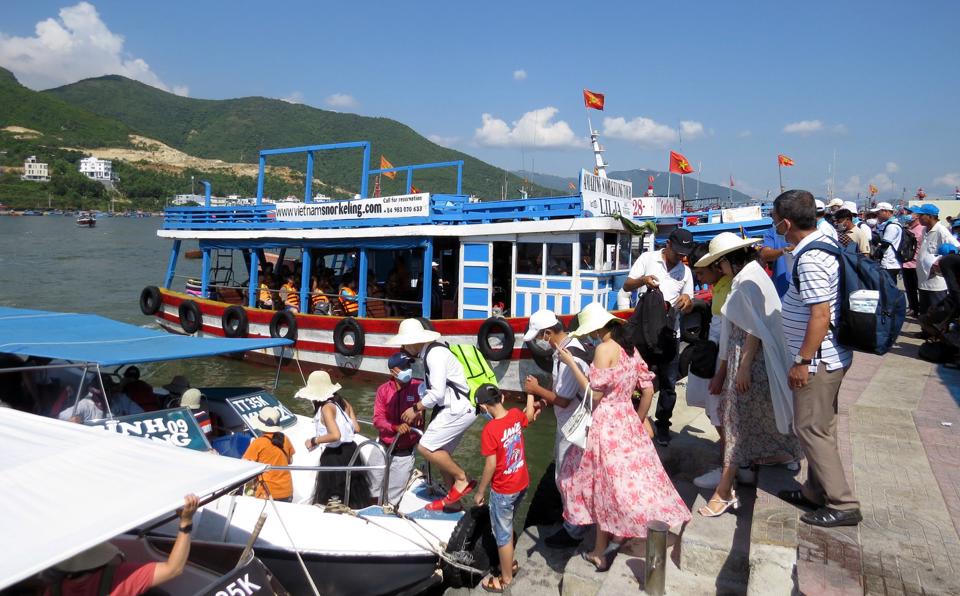China border reopening, Vietnam tourism boosted
Before the Covid-19 pandemic, an average of 7.5 million Chinese tourists traveled to Vietnam each year, accounting for one-third of the country's total international visitors.
Thousands of people crossed the Vietnam-China border on January 8 when the latter lifted border restrictions after three years of closure to combat the Covid-19 pandemic.
| Chinese people queue up to make immigration papers at the Lao Cai border gate on January 8. Photo: Vietnam News Agency |
At the Huu Nghi border gate in Lang Son Province, some 1,500 Chinese left for China. According to Ho Tien Thieu, Chairman of the provincial People's Committee, local authorities were prepared for the surge of border crossings.
The Chinese government only allows passing at the Vietnam-China border gate of Huu Nghi. Third-country nationals are not allowed to enter China from here.
At the Mong Cai border post in Quang Ninh Province, more than 1,000 Chinese left Vietnam for their home country early in the morning. Travelers must test negative for Covid-19 48 hours before crossing the border post.
Meanwhile, the border crossing between Vietnam and China is very busy at checkpoints in Lao Cai Province. Migrants in Vietnam only need a body temperature check. If there are any signs of Covid-19 infection, they will be tested quickly and receive treatment if the result is positive.
China’s ease of travel restrictions and border reopening are expected to boost Vietnam’s economic trade and tourism.
Vietnam aims to bring the total number of travelers to the country to 22 million by 2023, including eight million international visitors.
According to the Vietnam National Administration of Tourism, China is one of Vietnam's major source markets. Before the Covid-19 pandemic, Vietnam received an annual average of 7.5 million Chinese tourists, representing one-third of the number of foreign arrivals to Vietnam before the pandemic.
With the reopening of China to international travel, Vietnamese tour operators have been gearing up to welcome Chinese tourists.
| A group of Chinese tourists traveled in Khanh Hoa Province's Nha Trang City before the Covid-19 pandemic broke out worldwide in 2020. |
Vu Thi Huong Giang, director of the Mong Cai - Quang Ninh Travel Association, stated that tourism businesses had reviewed their operations and prepared to receive Chinese tourists once the Mong Cai border gate opened.
Local eatery and accommodation facilities have come up with detailed plans to meet the demand of Chinese travelers, Giang said.
Vietravel Quang Ninh’s director Nguyen Thi Truc added that the company had developed new products, such as the night boat tour, to provide additional options for Chinese visitors.
Nguyen Nhat Hang, manager of Crown Nha Trang Hotel in Khanh Hoa Province’s Nha Trang City, said that the number of international visitors has remained low over the last year since Vietnam lifted border restrictions in March 2022, so her hotel has not been in full operation.
So China’s decision may give a chance for local businesses to recover their performances, she said. “We have taken a look at the entirety of our facility and hired more staff to get prepared for incoming foreign tourists.”
Tu Quy Thanh, general director of Lien Bang Travel Company, said that the preferences of Chinese travelers may have changed, so travel enterprises need to revise their policies, products, and services to meet their demands.
“What should be prioritized now is to ease visa requirements to attract Chinese tourists into Vietnam, or they may opt for Thailand or Malaysia,” Thanh said.
Sharing the same view, Vu The Binh, Chairman of the Vietnam Tourism Association, said that the Chinese Government might remain cautious to prevent further waves of the disease, so there is the possibility of border closure again without prior notice.
Tourism authorities and businesses should keep abreast of the Chinese government's policies and maintain close communication, he said.
Binh also suggested that local tourism enterprises develop high-quality products and services to meet market demand and improve the quality of services to take advantage of the opportunity.












